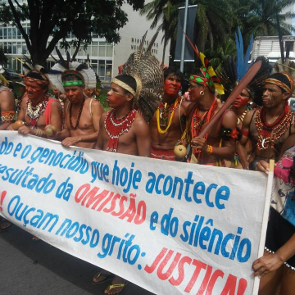Three indigenous leaders killed in the space of a week

Front Line Defenders mourns the loss of Brazilian human rights defenders Gilmar Alves da Silva, Adenilson da Silva and Eusébio Ka'apor. All three indigenous rights activists were shot and killed in the span of one week. State authorities have reportedly remained silent about the killings to date.
Gilmar Alves da Silva and Adenilson da Silva were the leaders of the indigenous communites of Tumbalalá and Tupinambá, respectively, in the state of Bahia. Eusébio Ka'apor was a leader of the Ka'apor indigenous community in Alto Turiaçu in the state of Maranhão.
Indigenous and land rights defenders in Brazil face incredible risks for their work. They face defamation, attacks, and killings for challenging the economic and political interests of government and private companies. In 2014, Front Line Defenders documented the killings of 12 human rights defenders in Brazil, many of whom were outspoken advocates for and from indigenous communities.
On 26 April 2015, indigenous leader Eusébio Ka'apor was killed in the indigenous territory of Alto Turiaçu, in the state of Maranhão. He was shot in the back by two hooded men, suspected to be loggers. Eusébio Ka'apor, along with other members of his community, had been involved in monitoring the presence of illegal loggers in the territory, which had resulted in the closing of all operations of illegal exploitation of timber in the region in March 2015. Apparently, Eusébio's name was known to be on a death list drawn up by loggers. Although the indigenous leaders of Alto Turiaçu had denounced the illegal exploitation of timber to the authorities, including the involvement of the local police, no measures had been taken by the State to protect them.
On 1 May 2015, another Tupinambá indigenous leader, Adenilson da Silva, also known as ''Pinduca'', was shot and killed by three hooded gunmen. At the time of the attack, Adenilson was with his wife, one-year old son, and 15 year-old daughter. The family were returning from close to the village of Serra das Trempes, in the state of Bahia. His wife, Zenaildes, was shot in the legs and the back during the attack. Adenilson's daughter was able to flee and alert indigenous chiefs via mobile phone, who in turn immediately contacted the authorities. Reportedly, Zenaildes was able to protect their son until she was rescued by agents of the National Indian Foundation (FUNAI) who had been alerted of the attack by the indigenous chiefs. Adenilson's baby son is currently hospitalized. Zenaildes shall be forced to undergo leg surgery due to the injuries sustained.
Just two days after Adenilson de Silva's murder, human rights defender Gilmar Alves da Silva was shot and killed on 3 May 2015. Gilmar was riding his motorcycle to the village of Pambú, located in the territory of the indigenous community Tumbalalá, when unidentified persons in an approaching car shot him. Gilmar was reportedly able to reach Pambú on his motorcycle and inform members of the community of what had taken place before dying. According to the information received, the military police were able to locate the car used by the author of the killing, in which the guns used to kill the indigenous rights defender were found. However, the perpetrator has not been apprehended.
According to the Indigenous Missionary Council (Conselho Indigenista Missionário – CIMI), violence and targeted killings against indigenous leaders have intensified in the last two years in Brazil. In 2014, the Public Federal Ministry identified a criminal organisation in the state of Mato Grosso, which had the objective of invading indigenous lands, and was operating in the states of Mato Grosso do Sul, Bahia, Maranhão and Goiás. CIMI recently raised concerns that the criminal organisation had begun operating in the region in which these three killings have taken place.
In addition, in 2012, a parliamentary group, known as "rural workbench" (in Portuguese, bancada ruralista) proposed the 215th constitutional amendment, the PEC 215, which intends to delegate the duty of demarcation of indigenous territories, as well as the ratification of land already approved, exclusively to Congress. The motion is currently being discussed. Indigenous leaders have actively protested against the constitutional amendment, which would further delay the demarcation process and recognition and protection of their ancestral lands.
Front Line Defenders strongly condemns the killings of indigenous leaders Gilmar Alves da Silva, Adenilson da Silva and Eusébio Ka'apor, which it believes to be directly linked to their leading roles in defence of their indigenous communities and territories. Front Line Defenders is concerned at the reported lack of an effective investigation by police on the killings.
